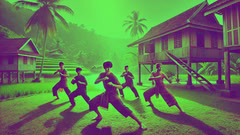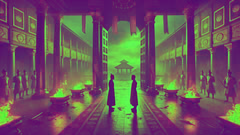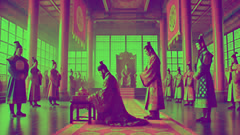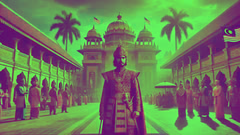Introduction
In the heart of the Malay Archipelago, where the Strait of Malacca glittered beneath the golden sun and merchant ships sailed from distant lands, rose a city unlike any other: Malacca, the radiant pearl of the region. Here, the sultan’s palace stood tall above bustling markets, its whitewashed walls and gilded domes reflecting the ambitions and dreams of an empire. The air was thick with the scent of nutmeg and cloves, and the laughter of traders blended with the distant calls of muezzins from ancient mosques. It was in this thriving world, where cultures collided and destinies were shaped, that the legend of Hang Tuah was born—a tale whispered by riverside storytellers and immortalized in the hearts of generations. Hang Tuah, whose name evoked awe and pride, was more than just a warrior. He was the embodiment of loyalty, a beacon of wisdom, and a symbol of Malay unity. Raised among humble roots in the quiet village of Kampung Sungai Duyung, his spirit burned with an unyielding sense of duty to his people and his Sultan. From a young age, Tuah’s courage shone through every challenge, whether in defending his village from marauders or in outsmarting rivals with his quick wit. But it was his deep sense of loyalty—to his friends, to his Sultan, and to the spirit of Malacca—that set him apart. As Tuah’s fame grew, so did the challenges he faced: bitter rivalries, palace intrigues, and threats from foreign invaders. Each trial tested not just his martial skills but the very core of his beliefs. Through swirling monsoon storms, shadowy jungles, and glittering royal courts, Hang Tuah’s journey became the story of a nation—a tapestry woven with courage, sacrifice, heartbreak, and hope. Step into a world where honor is sacred, friendships are forged in fire, and the fate of empires rests on a single man’s unwavering heart.
The Making of a Warrior: Hang Tuah’s Early Trials
Hang Tuah’s legend began in the peaceful village of Kampung Sungai Duyung, nestled amid emerald rice paddies and coconut groves just beyond Malacca’s city walls. Born to humble parents, Hang Mahmud and Dang Merdu, Tuah grew up among a close circle of friends—Hang Jebat, Hang Kasturi, Hang Lekir, and Hang Lekiu. Together, they learned the ways of the land and sea, trained in silat beneath the watchful eyes of village elders, and shared dreams of adventure far beyond the horizon. Even as a boy, Tuah’s courage drew the admiration of his peers. He possessed a fierce sense of justice, always ready to defend the weak or settle disputes with measured words rather than fists. The stories tell of his swift intervention when a band of marauders threatened the village. Leading his friends, Tuah devised a clever trap along the riverbank, using bamboo spears and hidden pits to outwit the invaders. Their victory did not go unnoticed. News of their bravery reached the palace, carried by grateful villagers and wandering traders alike. When the Sultan of Malacca, Sultan Mansur Shah, heard of these extraordinary youths, he summoned them to court. The journey from their village to the palace was a rite of passage—leaving behind familiar fields and entering a world of dazzling opulence, rigid hierarchy, and hidden danger. Tuah, though awed by the grandeur, kept his humility and respect for tradition. In the palace courtyard, beneath the gaze of courtiers and foreign envoys, he and his friends demonstrated their mastery of silat and their unwavering loyalty to the Sultan. Impressed by their prowess and unity, the Sultan appointed Tuah as laksamana, or admiral, entrusting him with the defense of Malacca’s shores. But palace life was a far cry from the freedom of their village. The corridors echoed with rumors and schemes; jealous nobles watched the newcomers with wary eyes. Tuah’s sense of justice soon brought him into conflict with powerful figures who resented his rise. One such rival, the ambitious Bendahara Paduka Raja, sought to undermine Tuah at every turn. The seeds of jealousy and intrigue were sown early, threatening to turn the palace into a battlefield of wits and wills. Yet Tuah’s character never faltered. Guided by his parents’ teachings and the bond with his loyal companions, he walked the fine line between humility and authority. His leadership was tested by storms both literal and metaphorical: pirate raids along the coast, disputes among local chieftains, and the delicate balancing act required to keep foreign envoys at bay. Each trial hardened his resolve and sharpened his understanding of power—not just as brute strength but as wisdom, restraint, and vision. Among his closest friends, Tuah’s sense of brotherhood grew even stronger. They became not just warriors but confidants and counselors, bound by a shared code of honor. The villagers who once watched them practice in sun-dappled clearings now spoke their names with reverence. In the bustling heart of Malacca, as the Sultanate reached new heights of wealth and influence, Hang Tuah stood as a pillar of unity—his early trials forging the steel of loyalty that would define his every action.

Loyalty and Betrayal: The Sultan’s Test
Years passed, and Hang Tuah’s fame grew far beyond the walls of Malacca. As laksamana, he became the Sultan’s trusted envoy and the city’s shield against pirates, foreign agents, and threats from rival kingdoms. Yet the higher he rose, the more perilous his path became—especially as the intricate dance of court politics spun ever tighter. Among all his trials, none would test Tuah’s spirit more than the web of jealousy and suspicion that began to ensnare him. It started with whispered rumors—a word here, a glance there—carefully planted by those who envied his influence. The Bendahara Paduka Raja, once just a rival, now conspired openly with others who feared Tuah’s loyalty and strength. They accused him of plotting against the Sultan, of seeking to seize power for himself. The rumors found fertile ground in a palace beset by foreign intrigue and uncertainty. The Sultan, torn between trust and paranoia, was forced into an impossible decision. Fearing betrayal from even his most loyal servant, he ordered Tuah’s arrest. The news struck Malacca like a thunderclap. Within hours, Tuah was dragged before the royal council, stripped of his honors, and condemned without trial. His friends—Jebat, Kasturi, Lekir, and Lekiu—were stunned. The bonds of brotherhood stretched to breaking as they pleaded for mercy, but the Sultan would not be swayed. Tuah was banished from the city, his name erased from palace rolls. In the darkest days of his exile, he sought refuge deep in the rainforest. There, beneath towering hardwoods and veils of mist, he struggled to make sense of his fate. The jungle became both sanctuary and prison, its silence broken only by the mournful calls of distant hornbills and the rush of monsoon rain on the leaves. Yet Tuah did not curse his Sultan; instead, he clung to the values that had shaped him—patience, dignity, and faith that truth would prevail. Back in Malacca, chaos reigned. Hang Jebat, Tuah’s closest friend, could not accept the injustice. Consumed by rage, he took up arms against the Sultan, launching a rebellion that shook the very foundations of the kingdom. For weeks, the city was torn apart by violence—rooftops ablaze, marketplaces abandoned, the clash of steel echoing through deserted streets. The Sultan, realizing too late the depth of his error, was powerless to restore order. In a desperate bid to save his kingdom, the Sultan sought out Tuah in exile, begging for forgiveness and aid. Tuah’s heart ached for his friend but his loyalty to the Sultan—however flawed—remained unbroken. He returned to Malacca, sword in hand, determined to confront Jebat and end the bloodshed. Their duel in the shattered halls of the palace was a battle not just of blades but of ideals: loyalty against justice, tradition against rebellion, love against duty. In the end, Tuah’s loyalty won out. He defeated Jebat, though the victory left scars that would never fully heal. As Jebat fell, he forgave Tuah, understanding at last the impossible burden his friend bore. The city slowly returned to order, but the cost was dear—Tuah’s soul weighed heavy with grief and the knowledge that loyalty can be both a blessing and a curse.

The Glory of Malacca: Triumphs and Trials on Foreign Shores
After the tragedy that claimed his friend, Hang Tuah found himself changed—a man who had stared into the heart of loyalty and emerged both wiser and more sorrowful. Yet there was little time for mourning. Malacca stood at the crossroads of empires, its riches coveted by foreign powers who sent envoys and spies in equal measure. The Sultan, now keenly aware of Tuah’s value, placed even greater trust in his laksamana. Among Tuah’s most celebrated adventures were his diplomatic missions to distant lands. The Sultan tasked him with forging alliances and securing Malacca’s position as a maritime superpower. In one legendary journey, Tuah sailed across treacherous seas to the mighty Ming Dynasty in China. With him traveled not just gifts of gold and spices but also stories of Malacca’s wealth and hospitality. The voyage was perilous: monsoon storms battered their ship, and pirates lurked along the trade routes. Yet Tuah’s leadership kept morale high, guiding his men through every danger with a calm assurance that inspired unwavering loyalty. At the imperial court in China, Tuah’s wisdom and eloquence dazzled even the most jaded mandarins. He exchanged poetry with scholars, debated philosophy with generals, and charmed the Empress herself with tales of Malacca’s beauty. The Ming Emperor was so impressed that he presented Tuah with rare silks, porcelain, and—most symbolically—a ceremonial sword inscribed with blessings for peace and prosperity. The treaty they signed ensured safe passage for Malaccan ships and brought unprecedented wealth to the Sultanate. But not all encounters were so harmonious. On another mission to Majapahit—an empire famed for its cunning courtiers and ancient rivalries—Tuah found himself caught in a web of intrigue. The Majapahit king, skeptical of Malacca’s rise, challenged Tuah to a series of tests: riddles to solve, feats of arms to win, and secret plots to foil. Each trial was a test of character as much as skill, demanding not just martial prowess but patience, wit, and humility. Tuah’s triumphs won him both allies and admirers; his reputation spread from the jungles of Sumatra to the palaces of Siam. Back in Malacca, prosperity soared. The city’s harbors brimmed with ships from India, Arabia, China, and beyond. Spices changed hands alongside silk and gold, and the city’s mosques echoed with prayers from every corner of the Muslim world. Yet Tuah never forgot the fragile balance that underpinned it all. He worked tirelessly to strengthen Malacca’s defenses—training new generations of warriors, fortifying the city walls, and mediating disputes among the sultan’s fractious council. For all his glory, Tuah remained humble. He often retreated to quiet corners of the palace or slipped away to his childhood village, seeking counsel from elders or simply walking beneath the stars. He knew that power could be fleeting and that true greatness lay in service—first to his Sultan, but always to his people. His wisdom became legend, his sayings quoted by scholars and sung by poets: “Takkan Melayu hilang di dunia”—the Malays will never vanish from this earth.

Conclusion
Hang Tuah’s story endures because it speaks to the deepest truths of the human spirit—how loyalty, though often tested, can elevate or destroy; how courage is forged not in victory alone but in sacrifice and sorrow; and how unity is born from shared values as much as from shared blood. In the centuries since his time, the name Hang Tuah has become shorthand for honor and resilience—a guiding star for those who face their own storms, both within and beyond Malaysia’s shores. Today, his legend lives on in every telling: in the shadowy courtyards of Malacca’s old palace, in the bustling markets where traders still gather, and in the quiet hearts of those who yearn for justice and belonging. His keris may rest in a museum now, but his legacy remains sharp—a reminder that greatness is measured not just by triumphs but by the courage to stand unwavering when all seems lost.













